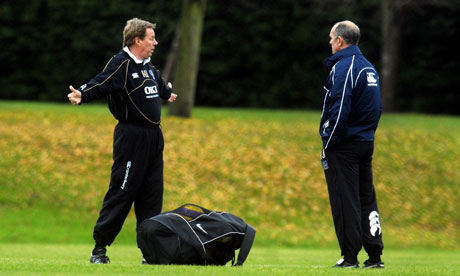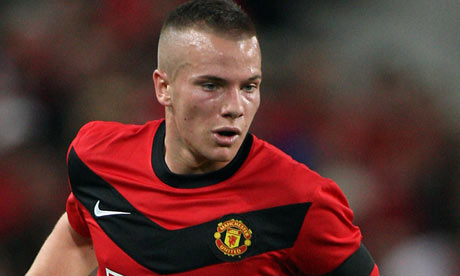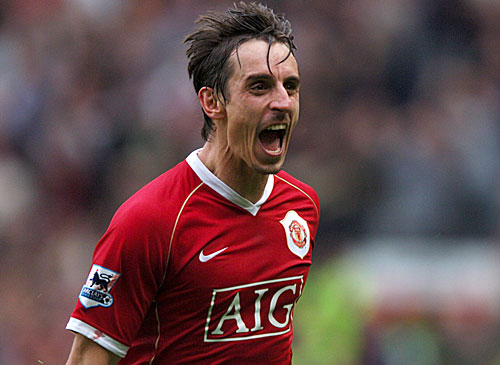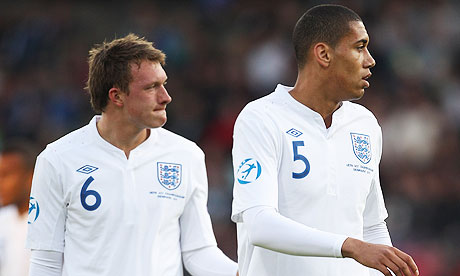We heard too much that we want a box to box central midfielder, a defensive midfielder or an attacking midfielder, but soccer coaches in countries other than England have always been innovative in evolving from convention to nullify or solve popular tactical trends.
We so have
- A defensive midfielder playing at an advance position
- A defensive midfielder being deployed in defense for an overall passing side focus on possession
- A roving winger who act as a playmaker instead of an conventional winger/playmaker
- Loop sided full backs
- Deep-lying playmakers as oppose to an advance one
Bringing in foreign coaches and managers like Jose Mourinho, Benitez and Wenger have changed how Sir Alex understands the game and react accordingly.
As fans, it is easy to say Carrick is fuck, Anderson is not up to it, but the demands of midfield, where most battle is fought, requires a group of midfielders that can play in a few different configurations successfully.
-------------------------
Iain Dowie introduces us to the brave new world of front-quarterbacks
Surfing through the sports TV channels late one night this week I came across a scene that I can only describe as rapturous, but also addled with dreamy incomprehension, like stumbling into a forest clearing and finding a baby faun with its fetlock caught in a gamekeeper's trap. As part of a Euro 2012 England squad preview item, Sky Sports News had placed Iain Dowie on a kind of raised papal dais flanked by a tactics board. From here Dowie was being encouraged to manipulate a series of plastic discs in a revolving, carefree, maniacal fashion, like a drunken auctioneer, while shouting out names ("Lampard! … Gerrard! … the Stewart Downings!") as well as numbers ("4‑2‑3‑1! 4-1-3-2!"). There was something soothing about watching Dowie peeking into the future with brimstone zeal, right up until the moment he started talking about Wayne Rooney playing next summer as "a false 10 … maybe even a front-quarterback".
I'm not here to mock either the notion of the front-quarterback or Dowie, whom I like as a pundit and admired hugely as a player whose every moment seemed to be spent in a tumbling, grappling wrestle, football as reinterpreted by the last man standing on the Raft Of The Medusa. I remember one Northern Ireland game where Dowie's teenaged marker, clearly not warned about all this, spent the entire 90 minutes in a state of outraged disbelief as the Dowie forearm expertly chopped his windpipe and the Dowie rump clattered once again into his breadbasket.
Dowie is also an educated man with an interest in theory, but even he seemed overcome by visions of an unusually fluid post-Spain England, cranium bulging with nascent idea-power like a caveman incanting his half-glimpsed vision of iron horses and flying man-birds. English football has struggled with its vocabulary of ideas in the past, but here was a sense of fences being leapt, mental chains thrown off, the front‑quarterback ushered into existence as a gorgeously promising oxymoron.
Really we should be encouraging this kind of creativity. The old positional straitjacketing has only ever reined in our soaringly incomplete half‑talents. We should instead be minting fresh roles, instigating the first real revolution in English player categories since the 1960s, and absorbing more fully into our vocabulary the positional complexity the Premier League brings every week. For example, David Silva is not so much an attacking midfielder as the consummate roving invention ferret. Yaya Touré has evolved from defensive shield to rampant barging goal bouncer. Ashley Young has become a top-class peripheral semi-jink. Scott Parker is a model of the central attack dwarf; while Frank Lampard has withdrawn recently into the panting box-chug pivot role. Most encouragingly, Jack Wilshere has shown great promise in the vital modern position of rubbery midfield flexi-hog.
There may even be something liberating for the next generation in a little linguistic Dowie-ing over. At times during the midweek friendly against Sweden it seemed that English football is experiencing a glut of young players who defy the normal categories. The hugely promising Phil Jones is, like Rooney, definitely a false something or other. But a false what? Essentially, Jones is really good at running forwards through great yawning foreigner-gaps, striding past the fallen and the prone like a coiffured robot warrior god. But is that really a position?
Similarly, there is the question of Jack Rodwell and his mysteriously non-specific talent. What does Rodwell do exactly? "He's a big boy," Roy Keane kept muttering admiringly on punditry duties. But being a big boy is not a position either, albeit at times against Sweden England did seem to be employing a 4-3-Big Boy-2 formation, as Rodwell lurked in a position best described as Floating Central Trot-About or Galloping Midfield Run-Hulk.
English football has always struggled to describe, and therefore also to visualise, positions that go beyond the standard. In Italy there are technical terms for the fine gradations within being "a striker" – prima punta, seconda punta, trequartista – that seem to go beyond simply big man, small man or being in the hole.
There has been great progress recently. The idea of the "false" player, particularly the "false 9", has already entered the vocabulary (and this is surely what Dowie meant rather than the edgier-sounding "false 10" who, according to expert advice sourced from Twitter, "makes runs into the space left by a false 9"; I think this must be a joke). Perhaps we have also accepted falseness because the word carries connotations of transgression and overseas sneak appeal, a position that can only exist at one remove from the real or the proper, a shadowy half-brother swooshing about the rafters in a cape.
As physiques and technical abilities coalesce in every area of the pitch, a galvanising positional libertarianism may well be football's final frontier. For now the suggestion amid Dowie's humid gesticulations, buoyed by a draught of unexpected English confidence, was of a more realistic kind of microdiversity, a technophile re-reclassification whereby English players may become unapologetically what they are – flawed but thrilling, unevenly gifted – rather than being instead defined by their deficiencies. It does at the very least sound like a lot of fun. Bring on the front-quarterback. Bring on the surging English Run-Hulk.






















































